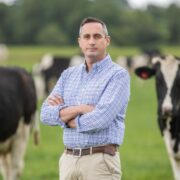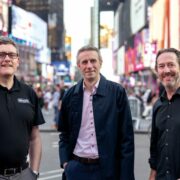Podcast Ep 168: The business world is being engulfed by the higher demands of ESG while still unsure of AI and automation. Not to fear, Tekenable founders Nick Connors and Peter Rose have you covered.
The two founders of Tekenable have seen it all in tech, but are approaching the rapidly changing business and tech worlds with a vigour you can only envy.
Established in 2002, TEKenable employs over 160 people. The business recently revealed plans to downsize its office in Dublin to around one-third of the size as a result of the success of remote working.
“Before you can grow, if the core business isn’t right, you’re not going anywhere”
In recent months it revealed plans to establish an ESG practice focused on helping its customers figure out their purpose, governance, strategy, decision-making, risk management, and accountability reporting. The new practice involves an investment of €600,000 and will create 10 new jobs in the areas of data collection and reporting, carbon reduction and return on investment.
This follows an earlier €500,000 investment to build technologies that accelerate innovation in the insurance and retail sectors and the acquisition of Greenfinch to create a scaled up cloud business.
The business is also razor-focused on opportunities in low code and how that could also lead to greater automation within businesses.
An interesting challenge
You get the sense that Connors (CEO) and Rose (CTO) are grasping emerging trends with practiced ease, but the road was challenging, at least in the early days. The two founders had to learn to apply discipline to the business, financially and not just technologically, and the result is their ability to adapt the business to today’s new trends and opportunities with a practiced agility.
Tekenable was borne out of the ashes of the collapse of Digital Channel Partners following the tech crash of 2002.
In a recent interview with ThinkBusiness, Connors said that the growth of the business was conservative for the first decade as it built bespoke tech solutions for banks and insurance firms.
A turning point came with both the opportunities afforded by Microsoft’s approach to the cloud and a sobering look at how it managed its finances.
Taking a more disciplined approach to innovation and finance saw Tekenable go from a €2m to €3m a year business to a business recording revenues of €10m a year and growing.
Getting the balance right gave the founders the confidence to drive the business forward by making smart bets on technology and businesses to acquire.
Connors recalls the origins of Tekenable. “Out of the burning embers of Digital Channel Partners we took a small group of people and nine customers whose projects would go belly up if we didn’t continue on with them. We pulled a team together and with no funding we flipped from liquidation into a brand new company. It was a bit of a risk but our customers were good to us because we had good people. Those nine customers got us going. We started breathing again and we started to grow the company.”
As the business grew acquisition offers came in and while the founders spurned those offers, insights from advisers gave them pause for thought. Rose recalls: “One of the comments that came back was that we were delivering great projects, but we weren’t delivering a business. And so we peered into that statement and asked what the gentleman meant. He said we weren’t taking the finances as seriously as we should
“And there were a lot of functions in the business that, perhaps if we were going to grow, we would need to put in place from HR to marketing to a sales operation. A lot of the sales, not exclusively, but a lot of the sales had been done by Nick and myself. And that’s not particularly scalable. So it was nothing earth shattering, or, or stunning, we simply started to do what every other business of slightly bigger scale to us was already doing. We hired a CFO who opened our eyes to what we should be doing, and we did it and we followed the advice that people who knew much better than us told us to do. There is no secret sauce; hire a CFO, take the finances seriously, and that gave us the money then to invest in some of the other functions that we needed, like a full-time finance team, hire a PR company, create a marketing team, grow our sales team and ground our technical team.
“It’s all very well delivering great projects but if you’re not making money out of them, if you are literally covering the bills, you do not have the money in the bank to fund any kind of expansion, diversification or delivery of new services. We had been just ticking along the bottom profitability-wise. But it wasn’t a dramatic change. It was just a series of small changes that meant we suddenly found ourselves with the money to do the things we always wanted to do but didn’t quite see how to fund.
“It was the easiest change ever because it took a lot of pressure off us. We weren’t making profit but we weren’t making a loss either, and there’s an enormous amount of pressure that goes along with that.”
Connors agrees: “We were keeping our customers happy but were not making a profit. So we had that piece right. Before you can grow, if the core business isn’t right, you’re not going anywhere.”
The freedom to focus on areas of growth saw Tekenable flourish through its longstanding partnership with Microsoft and two years ago the company added a dedicated Salesforce practice.
“People thought we were mad to be investing in both platforms but you know the bigger customers we work with have both,” said Connors. “They use multiple technologies. We want to serve our customers right so that when they come to us we can talk about it. There’s still a long way to go with the cloud and there are organisations that haven’t moved to the cloud and are swimming against the tide.
“The reality of cloud is that it is just like running water or electricity, it’s a utility, it’s a service.”
The E, the S and the G
This brings us to Tekenable’s investment in ESG (environmental, social and governance). It is apparent, however, that when many people think of ESG they tend to focus on the E aspect and don’t realise that the S and G are fundamental to how businesses will run and report in the decades ahead.
I ask Connors and Rose about what ESG really means for businesses today.
“The fundamental part for businesses is that they have to align with regulations that are coming down the track,” Connors explained. “If they are a supplier to a customer they have to comply. Some of it will be light touch but complying with these guidelines will be key. It’s nice to say you are doing something to save the world and be part of the sustainability push, which is what we all have to do as businesses. But there are fundamentals to this that you will have no leeway on. You have to be compliant or you won’t be able to do business with certain customers.”
Rose added: “The regulatory landscape is becoming more and more defined. It has been very fragmented with lots of different standards. But with the advent of the Corporate Sustainability Reporting Directive (CSRD) and taxonomy coming in from the EU on mandatory reporting, it is really strengthening up and becoming more difficult to do. You need to be compliant with the regulatory landscape.
“It’s not just about compliance, there are aspects to the sustainability agenda that are really good for your business. When people think of sustainability, they think of reducing carbon emissions, for example. But if you actually move an on-premises server to the cloud you could get up to a 98% carbon reduction and move up the ranks because of the difference in not having to buy the hardware. A lot of that arises from the fact that Microsoft’s investing heavily in their data centres not drawing power from the grid but using reusable power sources to power the data centre. So the electricity going into the data centres is actually zero carbon emissions to start with.”
Rose said the ‘E’ for environment is just part of the picture that firms need to grasp. There are business opportunities in societal impact and governance. “If you look at the broader agenda on sustainability, and not just the carbon side of things, you’ve got diversity and inclusion, for example. I was really proud of our of our record in diversity. We did a survey with 19 or 20 different nationalities represented in the business, for example. And there’s huge benefits to that not just meeting the UN Sustainable Development Goals, but you’re really bringing in different cultures and different viewpoints and a whole new level of creativity into the business. When you start to do you start to take diversity seriously, it is not just about regulatory compliance, it’s actually about business benefits as well.”
In recent months Tekenable revealed how it plans to reduce its office footprint based on the reality that because of the explosion in remote and hybrid working that came with the pandemic, it didn’t need so much office space.
Tekenable, which was recently recognised as the 15th Best Medium Workplace in Ireland for 2023 and has doubled its headcount in the last five years, has moved to a smaller office in Dublin that is one-third the size of the original one.
The move to hybrid working is being fully embraced across the business. “I was sitting in a car with Nick a few months ago and we were travelling to visit a customer and we got stuck in a traffic jam somewhere around Merrion Square. And we both just looked at each other simultaneously and said we don’t know how we used to always do this, it is insane. We could have literally jumped on a call with this customer and move on to a call with another customer 1,000 miles away.”
Connors added: “We were doing a piece of work with a customer in Switzerland this week and offered to physically meet them and they said ‘no, we’d be happy to do it on Teams.’” So customers are pushing back and saying ‘no, we don’t want to meet you’ and that works for us. That’s good.”
Let AI be your co-pilot
Unless you’ve been hiding under a rock, the whole subject of artificial intelligence (AI) has entered the public spotlight ever since OpenAI released ChatGPT to the public late last year. This has spurred all manner of debate about the implications of this technology for our jobs and indeed humanity as the machines show just how clever they can be.
Asked about what ChatGPT could mean for the future of work, Rose says the panic has been a bit overblown and we need to think about its use differently. “ChatGPT is really advanced, it is really impressive. But it is just another technology tool. It isn’t capable of running solo. It’s an augmented workforce tool. It is something that helps people to be more effective, more efficient. I would be extremely cautious before letting it or any other AI technology have full automated reign over anything. If you think of AI as a sort of top fuel drag racer, it you stamp on the accelerator it will do one of two things, it will either go off rocketing down the track at a super pace or it will blow up and the wheels will fall off. And there’s nothing in between.
“So nobody in their right mind is going to let ChatGPT or any other AI technology respond automatically to customer correspondence without a human having oversight on what is sent back. Microsoft uses the term ‘co-pilot’. It sits alongside you, it helps you, but it is not steering the ship or ultimately making decisions about people’s loan applications.”
Looking to the next 20 years of the business, Connors said: “We’ve had a very successful acquisition a few years ago and we will probably continue down that road by making acquisitions that we think could benefit and grow the company.
“We have ambitions and aspirations to continue growing the company and growing outside Ireland is our main focus at the minute.”






